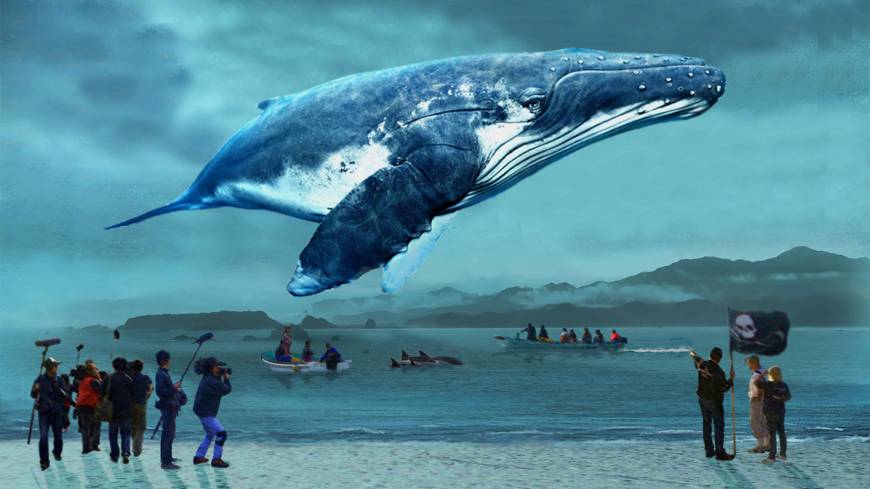A WHALE OF A TALE
Fine Line Media
Reviewed by: Harvey Karten
Director: Megumi Sasaki
Screenwriter: Megumi Sasaki
Cast: Jay Alabaster, residents of the Japanese town of Taiji
Screened at: Park Ave., NYC, 8/7/18
Opens: August 17, 2018
It’s easy for moralists to sit back, sipping their bourbon, smoking their Cuban cigars, and waxing poetic about the need for a universal code of morality. Never mind that some cultures are so poor that many must kill creatures to make a living, and we’re talking about people who live in countries where earning a dollar a day for mining is acceptable. Many of us in the U.S. (members of PETA like me) might understand, if not condone, the poaching of elephants in Kenya for their valuable tusks, the clubbing of dogs in China where dog meat is no different from cow meat, and the massive slaughter of animals in our own factory farms. After all, if most Americans eat beef, pork, lamb and the like, who are we elitists to complain about the killing of any animal? What about the clubbing of seals in Canada, a rich country, the seals used not for survival but for the making of fur garments. And we can go on and on about the fur trade in general, a lucrative one, and never mind the torture that animals must go through to provide chinchilla and mink.
There is one form of killing that—at least according to Megumi Sasaki’s documentary “A Whale of a Tale”—is almost universally condemned, and that’s the fishing of dolphins, centered on the village of Taiji which was the subject of the Oscar Best Documentary of 2010, “The Cove.” It’s not that dolphins feel more pain than halibut, salmon, tuna and swordfish, but that they are creatures of intelligence matching that of human beings. They are fished out of international waters by the whalers of this Japanese town of 3,000, whaling has been their tradition long before Moby Dick carved out revenge, and they’ll be damned if they let foreigners come in with cameras to tell them what to eat or catch.
As with “The Cove,” with its sobering look at the butchering of scores of dolphins trapped in a cove, the industry has been the focus of mass protests, not only in “the West” as the whalers call the accursed protesters, but also in the Philippines, a march with signs among the images captured in “A Whale of a Tale.”
On the one side are activists who are in Japan and appear 100% from the West, though many of them have been denied re-entry into the country because of their use of Facebook and Twitter to tell the world about what they consider a great evil. On the other are the whalers who depend on dolphins which they catch and kill and sell for food, or if they can manage it, sell the fish to Seaworld-type centers—which in my mind are as immoral as the late, ungreat, Ringling Bros. Barnum and Bailey circus. In the middle is Jay Alabaster, an American journalist from Arizona who teaches English in Japan, who is fluent in Japanese, and who serves as a neutral party trying to bring the opposing groups together. His view is that the small-town Japanese cannot begin to match the power of the foreign protesters because locals are not computer-savvy on Facebook and Twitter and therefore cede the propaganda ground to the protesters.
When the cameras are not on the waters around the village, they are at a press conference bringing the two sides together, including the mayor who would prefer to change the economy to tourism rather than whaling. It’s probably not because the mayor has had a moral epiphany but rather that the Japanese do not eat much whale meat—the equivalent in a year as a slice of ham—and prices have tumbled. As Seaworld-type entertainments are biting the dust, there may not be much market for dolphins there either. And many believe the dolphins have toxic loads of mercury making them inedible.
By the way, from what I get, what the Japanese call whales are what we call dolphins. The camera-work is stunning, contrasting the bonhomie of a small village with the madhouse atmosphere in overcrowded Tokyo. The arguments are balanced, the director seeming to be impartial. In any case the industry is on its last fins, which means that not only the whalers will be deprived of a living, but Hollywood would be deprived of a moral tale to trot out at awards time.
Animal rights activists will rejoice while traditional Japanese fishermen will be outraged by this effective story of the struggle to ban the exploitation of whales in a small Japanese town. A sequel to the Oscar-winning doc “The Cove.”
Unrated. 95 minutes. © 2018 by Harvey Karten, Member, New York Film Critics Online
Story – B+
Acting – B+
Technical – A-
Overall – B+






